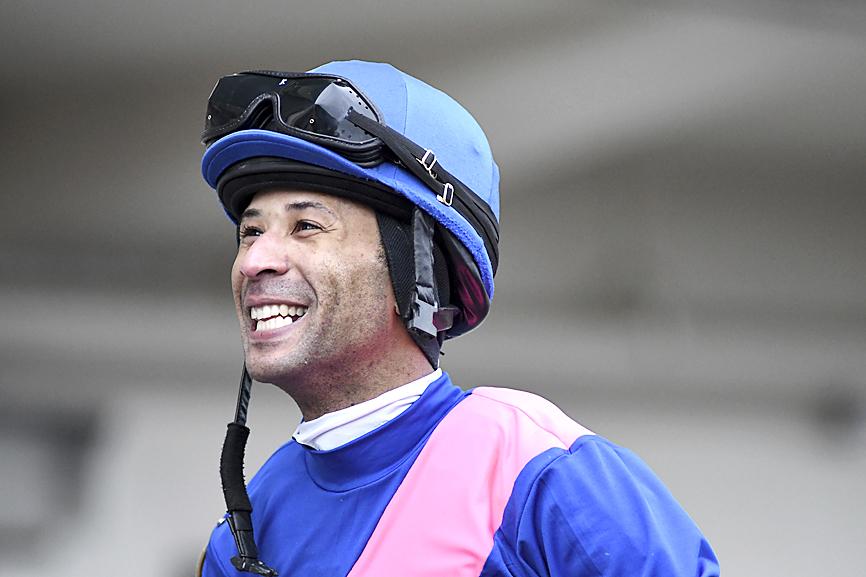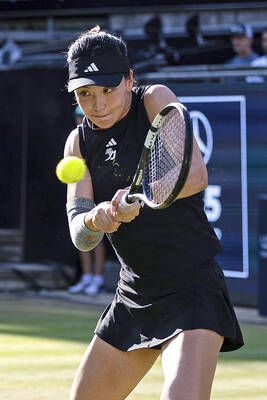Long before Kendrick Carmouche started riding horses growing up in Louisiana, black jockeys were synonymous with the sport.
Black riders were atop 13 of the 15 horses in the first Kentucky Derby in 1875 and won 15 of the first 28 editions of the race.
Everything has since changed: Tomorrow, Carmouche is to be the first black jockey in the Kentucky Derby since 2013, and is just one of a handful over the past century.

Photo: AP
Carmouche is one of the few remaining black jockeys in the US.
Much like Marlon St Julien in 2000, Patrick Husbands in 2006 and Kevin Krigger in 2013, his presence in horse racing’s biggest event is a reminder of how the industry marginalized black jockeys to the point that they all but disappeared from the sport.
“As a black rider getting to the Kentucky Derby, I hope it inspires a lot of people, because my road wasn’t easy to get there and I never quit,” Carmouche said. “What I’ve been wanting all my career is to inspire people and make people know that it’s not about color. It’s about how successful you are in life and how far you can fight to get to that point.”
Carmouche is a success story in his own right. He is the son of a jockey who has won more than 3,400 races and earned US$118 million since beginning to ride professionally in 2000.
He came back from a broken leg three years ago and set himself up for his first Kentucky Derby mount by riding 72-1 long shot Bourbonic to victory in the Wood Memorial on April 3.
Bourbonic is to leave from the 20th post in tomorrow’s race at Churchill Downs.
He is also a rarity in a sport now dominated by jockeys from Latin America.
“Obviously, there haven’t been many in recent decades, but if you go back to the early years of the derby — the late 1800s, early 1900s — black jockeys dominated the Kentucky Derby,” NBC Sports analyst Randy Moss said. “Guys like Isaac Murphy and Jimmy Winkfield.”
Carmouche joins St Julien as the only US-born black jockeys in the derby since 1921, which even then was long after the era dominated by Murphy, Winkfield and others.
Chris Goodlett, a historian at the Kentucky Derby Museum, cited a combination of Jim Crow laws and segregation in the US, intimidation by white riders and decisions by racing officials, owners and trainers for the decline of black jockeys in the early 20th century.
One example was white counterparts riding Winfield into the rail at the Harlem Race Track outside Chicago, and injuring him and his horse.
“Consequently, white trainers and owners would be [more] reluctant to ride black jockeys on their horses due to instances like that,” Goodlett said. “We see it also just from an administrative point of view, as well: fewer licenses being issued to black jockeys, sometimes not issued at all.”
Knowing the history of black jockeys, Husbands is inspired by Carmouche’s journey.
Husbands said that Carmouche becoming the first black jockey to win the Kentucky Derby since 1902 “would be a blessing. It would bring tears to a lot of people’s eyes.”
The usually talkative and confident Carmouche paused several times trying to put into words what it would mean to follow the footsteps of jockeys like first Derby winner Oliver Lewis.
“From my perspective, if I win this race, man, it would touch a lot of people,” he said. “A lot of people will be crying, a lot of people will be happy and a lot of happy tears.”

Twelve days after winning her second Grand Slam title at the French Open, Coco Gauff fell at the first hurdle on grass in Berlin on Thursday as beaten Paris finalist Aryna Sabalenka advanced to the quarter-finals. Recipient of a first round bye, American Gauff lost 6-3, 6-3 to Chinese qualifier Wang Xinyu as world number one Sabalenka beat Rebeka Masarova 6-2, 7-6 (8/6) in her second round tie. Winner of 10 main tour titles, including the US Open in 2023 and the WTA Finals last year, Gauff has yet to lift a trophy in a grass-court tournament. “After I won the first

Lionel Messi drew vast crowds and showed flashes of his brilliance when his Inter Miami side were held to a goalless draw by African giants Al-Ahly as the revamped FIFA Club World Cup got off to a festive start on Saturday. Fans showed up en masse for the Group A clash at the Hard Rock Stadium, home to the NFL’s Miami Dolphins, but Messi could not fully deliver, his best chance coming through a last-second attempt that was deflected onto the crossbar. Inter Miami next face FC Porto on Thursday in Atlanta, while Al-Ahly, who benefited from raucous, massive support, are to

Sergio Ramos on Tuesday outfoxed two Inter players and artfully headed home the first goal for Monterrey at the FIFA Club World Cup. The 39-year-old Ramos slipped through the penalty area for the score just as he did for so many years in the shirts of Real Madrid and Spain’s national team, with whom he combined smarts, timing and physicality. Ramos’ clever goal and his overall defensive play at the Rose Bowl were major factors in Monterrey’s impressive 1-1 draw against the UEFA Champions League finalists in the clubs’ first match of the tournament. “There is always a joy to contribute to the

Aaron Civale got a little wild in the right-hander’s first start for the Chicago White Sox two days after he was traded by the Milwaukee Brewers. Civale on Sunday walked four of the first seven hitters he faced in a 2-1 loss to the Texas Rangers. The 30-year-old finished with four walks, one off his career high, while allowing six hits and two runs in five innings. He threw 65 strikes and 39 balls. Chicago trailed 2-1 when he was replaced by Dan Altavilla to start the sixth. “Not the cleanest,” Civale said. “It’s been a whirlwind of a week. First couple